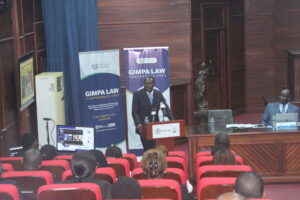Review 1992 Constitution to stop unnecessary expansion of seats in Parliament – Afenyo-Markins
 Mr Alexander Afenyo-Markins, the Deputy Majority Leader in Parliament, has called for the amendment of Article 93 of the Constitution to stop the unnecessary expansion in the number of seats in Parliament.
Mr Alexander Afenyo-Markins, the Deputy Majority Leader in Parliament, has called for the amendment of Article 93 of the Constitution to stop the unnecessary expansion in the number of seats in Parliament.
He said the amended article could impose restrictions to help ease pressure on the country’s public purse.
“Article 93 puts an upper limit on the number of Members of Parliament (MPs) that must be elected each year.
“It is not encouraging that a small country like Ghana with its many financial problems has 275 MPs, while Australia with its financial muscles has 151 MPs and 76 senators,” he said.
The Deputy Majority Leader said this at this year’s Ghana Institute of Management and Public Administration Law Conference in Accra.
The conference, organized by GIMPA and the Konrad Adenauer Stiftung, is on the theme: ” The 1992 Constitution of Ghana at 30: Taking Stock, Assessing Progress, and Reflecting on the Future.”
“We still need to look at the number of seats we have in Parliament. If we give the opportunity to the Electoral Commission, I am sure they will look at our population and say they want to create about 30 more, but in my view, they are not healthy,” he said.
Mr Afenyo-Markins called for the review of Article 94 of the Constitution, making post-secondary education, which might not be tertiary, the minimum qualification for an individual to enter Parliament.
That, the Deputy Majority Leader said, was aimed at ensuring that those who entered Parliament had the necessary capacity to engage in meaningful debate.
He also called for the amendment of Article 78 of the Constitution, which affected Parliament of its quality and capacity to do proper scrutiny of its duty.
Article 78(1) of the Constitution requires the President to nominate a certain number of Ministers from Parliament, and I hold the view with all humility that this provision should be reviewed.
He said the provision unnecessarily encouraged the Executive’s intrusion into Parliament and made it impossible for MPs who become Ministers to criticize the policies and actions of the Government in which they serve as Ministers.
It also encouraged non-Minister MPs to refrain from criticising the Government of the day out of the fear that they might be overlooked during the subsequent nominations of Ministers of State.
“If we review the provision critically, it will help MPs assert themselves and have what it takes to demonstrate that you are indeed representing the people.
“Some of the MPs who accepted Deputy Ministerial positions have expressed a lot of regret. A chairman of a Committee in Parliament is better than a Deputy Minister in terms of learning and capacity building.”
He said the Council of State established by the authority of Article 89 of the Constitution should be converted into an Upper Chamber of Parliament through an amendment of the same provision.
That, he stated, would make the provision a better way to engage in a productive use of the experience and the elderly statemen who occupied the seat on the Council of State.
“Ghana needed an upper chamber known as the House of Elders, whose elections shall be non-partisan, with the primary role of moderating the current parliamentary excesses and extreme partisanship,” he said.
Professor Samuel Kwaku Bonsu, Rector of GIMPA, said the Conference was to provide a platform for discussions relating to the 1992 Fourth Republican Constitution, 33 years after its adoption by the citizenry.
Dr Kwaku Agyeman-Budu, the Dean, GIMPA Faculty of Law, said the conference was a biennial event introduced in 2016 to provide a collegial platform for the discussion of topical national and international issues and propose solutions.
Source: GNA
